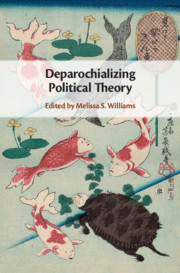Book contents
- Deparochializing Political Theory
- Deparochializing Political Theory
- Copyright page
- Dedication
- Contents
- Tables
- Contributors
- Preface and Acknowledgments
- Note on the Text
- 1 Introduction
- 2 Deparochializing Political Theory and Beyond
- 3 Recentering Political Theory, Revisited
- 4 A Decentralized Republic of Virtue
- 5 Deparochializing Political Theory from the Far Eastern Province
- 6 Is Popular Sovereignty a Useful Myth?
- 7 Authoritarian and Democratic Pathways to Meritocracy in China
- 8 Deparochializing Democratic Theory
- 9 Teaching Comparative Political Thought
- 10 Teaching Philosophy and Political Thought in Southeast Asia
- 11 Why Globalize the Curriculum?
- Index
11 - Why Globalize the Curriculum?
Published online by Cambridge University Press: 15 March 2020
- Deparochializing Political Theory
- Deparochializing Political Theory
- Copyright page
- Dedication
- Contents
- Tables
- Contributors
- Preface and Acknowledgments
- Note on the Text
- 1 Introduction
- 2 Deparochializing Political Theory and Beyond
- 3 Recentering Political Theory, Revisited
- 4 A Decentralized Republic of Virtue
- 5 Deparochializing Political Theory from the Far Eastern Province
- 6 Is Popular Sovereignty a Useful Myth?
- 7 Authoritarian and Democratic Pathways to Meritocracy in China
- 8 Deparochializing Democratic Theory
- 9 Teaching Comparative Political Thought
- 10 Teaching Philosophy and Political Thought in Southeast Asia
- 11 Why Globalize the Curriculum?
- Index
Summary
This chapter is written from Duncan Ivison’s dual perspective as a political theorist and as a senior administrator at the University of Sydney, which requires him to translate vision statements about the importance of “globalizing the curriculum” into practical reality. Ivison sets out three arguments for a globalized curriculum: the civilizational rationale, the global citizenship rationale, and the rationale of taking moral disagreement seriously. Only the last provides a strong underpinning for deparochializing a curriculum by decentering Western traditions in its core design. Like the “culture wars” of the 1990s, the civilizational rationale is an argument against decentering the West very much. Its purpose is to underscore the claim that ideas of toleration and respect for cultural diversity have their origins in Western thought traditions. The global citizenship rationale, which focuses on the kinds of knowledge students need to adapt and contribute to a globalized world, may not actually generate a strong commitment to going beyond Western traditions of cosmopolitan humanism. The best alternative is based on the reality of deep and persistent moral disagreements: if only we could learn how to hear them, we might find that sometimes cultural others have persuasive arguments against views we take for granted.
Keywords
Information
- Type
- Chapter
- Information
- Deparochializing Political Theory , pp. 273 - 290Publisher: Cambridge University PressPrint publication year: 2020
Accessibility standard: Unknown
Why this information is here
This section outlines the accessibility features of this content - including support for screen readers, full keyboard navigation and high-contrast display options. This may not be relevant for you.Accessibility Information
- 1
- Cited by
